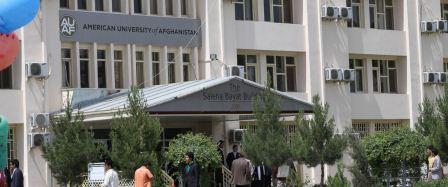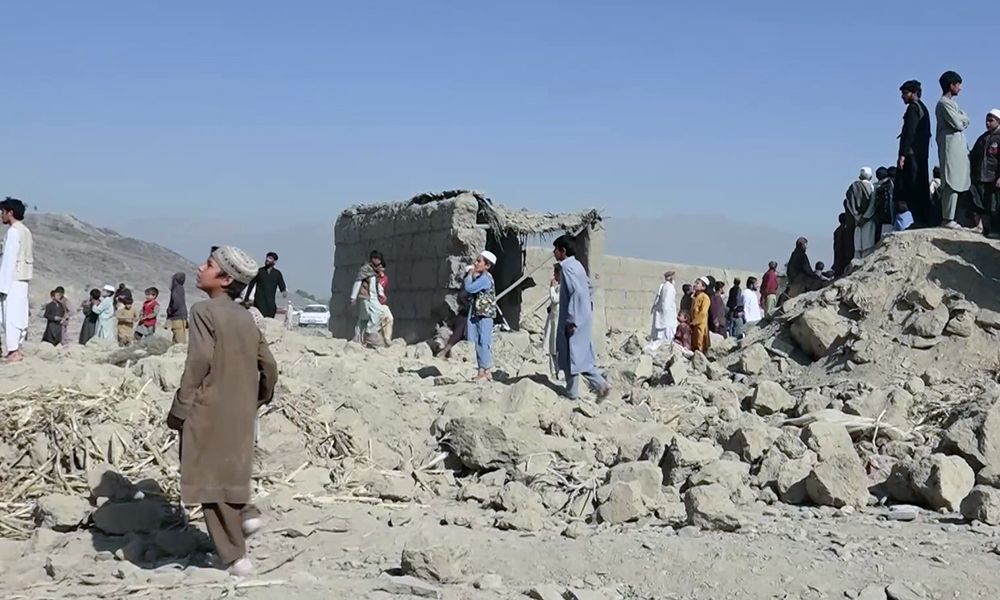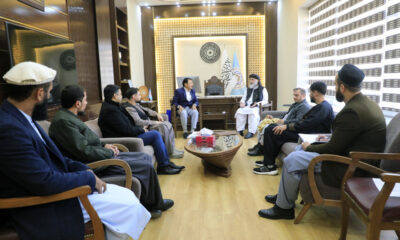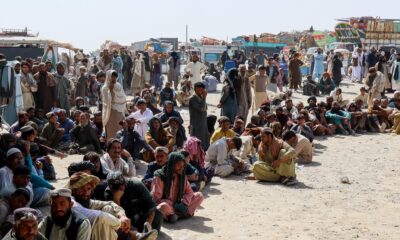Latest News
American University Attack Ends: Leaves 13 Dead 44 injured

 A deadly ten hour-long terror attack on the American University of Afghanistan in Kabul has ended early Thursday, according to a government’s security officials.
A deadly ten hour-long terror attack on the American University of Afghanistan in Kabul has ended early Thursday, according to a government’s security officials.
At least 13 people have been killed and 44 wounded including seven students, after the attackers blew up an outer wall before bursting into the university compound around 7pm on Wednesday; casualties may rise.
Elite Afghan forces surrounded the walled compound and eventually worked their way inside, according to a senior interior ministry official.
Sporadic gunfire could be heard through the night and, before dawn, police said the operation had concluded after they killed at least two attackers.
Foreign troops were also involved in the operation to secure the university. A spokesman for the international forces in Kabul said the number of foreign troops was “small”. The troops were “not directly involved or in a combat role, but advising their Afghan counterparts”, Brig Gen Charles Cleveland said.
General Abdul Rahman Rahimi, Kabul’s police chief, said early Thursday that 13 people were killed. Of the 13 killed, he said 7 were students, 4 were police officers and 2 were American University of Afghanistan guards.
Rahimi said 35 students and 9 police officers were injured.
Three attackers were involved in the attack, Rahimi said. The first attacker detonated a suicide car bomb at the entrance the other two managed to enter the campus, he said.
Interior Ministry spokesman Sediq Sediqqi said the attackers were armed with grenades and automatic weapons. The siege of the university lasted almost nine hours, before police killed the two assailants around 3.30 am, he said.
“Most of the dead were killed by gun shots near the windows of their classrooms,” Sediqqi said.
No organization has taken responsibility yet for the attack at the American University of Afghanistan.
Although suspicion falls on the Taliban, the group’s spokesman, Zabihullah Mujahid, would only tell the media that the group is “investigating,” according to The AP.
However, Afghanistan Presidential Palace said the findings of National Directorate of Security (NDS) indicate that the terror attack on American University was organized on the other side of the Durand line, Pakistan.
During an extraordinary session of NDS, President Ghani in a telephone call to Pakistani army chief of staff urged for taking serious measures and arresting the perpetrators of this incident.
Pulitzer Prize-winning photographer Massoud Hossaini tweeted that he was stuck on campus and heard gunshots and explosions, noting “this maybe my last tweets.”
But he escaped. He spoke with the AP about the harrowing experience, saying he was in a classroom with 15 students when he heard an explosion:
” ‘I went to the window to see what was going on, and I saw a person in normal clothes outside. He shot at me and shattered the glass,’ Hossaini said, adding that he fell on the glass and cut his hands.
“The students then barricaded themselves into the classroom, pushing chairs and desks against the door, and staying on the floor.
Hossaini and about nine students managed to escape from the campus through a northern emergency gate.
” ‘As we were running I saw someone lying on the ground face down, they looked like they had been shot in the back,’ he said.”
 President Ashraf Ghani’s office said he had visited some of the wounded in hospital on Thursday morning and had also extended condolences to the victims’ families.
President Ashraf Ghani’s office said he had visited some of the wounded in hospital on Thursday morning and had also extended condolences to the victims’ families.
President Ashraf Ghani called the assault “a cowardly attempt to hinder progress and development in Afghanistan”.
“Attacking educational institutions and public places and targeting civilians will not only fail to shake our determination, but will further strengthen it to fight and eradicate terror,” he said in a statement.
The U.S. Embassy in Kabul has condemned the “heinous attack” on the American University Of Afghanistan that left 12 people dead, including seven students, three police and two security guards.
U.S. Ambassador P. Michael McKinley called Wednesday’s attack “a cruel and cowardly act.”
“Our thoughts and prayers are with those killed and injured, as well as with the victims’ families, colleagues, and friends,” McKinley said, in a statement. “We remain strongly committed to the people of Afghanistan who are dedicated to establishing lasting peace and security and building the brightest possible future for their children.”
The school says on its website that it “embraces diversity and community” in Afghanistan.
 The American University of Afghanistan, which opened 10 years ago, has about 1,700 students.
The American University of Afghanistan, which opened 10 years ago, has about 1,700 students.
The attack on AUAF comes two weeks after two teachers working at the university—an American and an Australian—were kidnapped while on their way from their guesthouse to the campus. Their whereabouts are unknown.

Latest News
IEA rejects Russia’s claims of foreign militants in Afghanistan
He further called on Russian authorities to reassess their understanding of the situation in Afghanistan and to update their reports based on objective facts on the ground.

The Islamic Emirate of Afghanistan (IEA) has strongly rejected recent claims by Russia regarding the presence of international terrorist groups inside Afghanistan, calling the allegations unfounded and based on inaccurate information.
Speaking on the issue, Zabihullah Mujahid, the spokesperson of the Islamic Emirate, said Afghanistan is fully secure and no foreign armed groups are operating within the country.
He stressed that the entire territory of Afghanistan is under a single authority, leaving no space for external groups to carry out activities.
“We regret that such claims are made from sources in Russia,” Mujahid said, adding that these allegations date back to the past, including the period of the U.S. occupation, and have no basis in current realities. “We categorically reject these assertions.”
He further called on Russian authorities to reassess their understanding of the situation in Afghanistan and to update their reports based on objective facts on the ground.
Latest News
Escalating violence in Pashtun regions during Ramadan raises concerns
He described these incidents as grave violations of international law and acts that have deepened fears among affected communities.

Amid the holy month of Ramadan, violence has continued in several Pashtun areas, raising serious concerns among local communities.
In a post in X, Manzoor Ahmad Pashteen, the founder and head of Pashtun Tahafuz Movement, noted that in Tirah, four Pashtun civilians were reportedly killed and six others injured during operations carried out by the Pakistani army. Protests that followed in Orakzai were also met with force, leaving four more individuals seeking peace and justice injured.
In Afghanistan’s Behsud district, 17 civilians, including women and children, were reportedly killed in airstrikes attributed to Pakistani forces, he stated.
He described these incidents as grave violations of international law and acts that have deepened fears among affected communities.
In recent days, additional casualties have been reported in Rozmak, Shawal (North Waziristan), Mubarak Shahi village (Mir Ali), Speen Wam, Abakhel village, Dosali, Takhte Khel (Lakki Marwat), Azam Warsak (South Waziristan), Bajaur, and Bannu, where clashes between security forces and armed groups have resulted in deaths and injuries among civilians, Pashteen said.
He stated that the ongoing violence reflects longstanding grievances in Pashtun regions. The Pashtun Tahafuz Movement (PTM) has stated that it will continue to oppose what it describes as injustices against Pashtun communities and will stand in solidarity with those affected.
Latest News
UNAMA reports civilian casualties from Pakistani airstrikes in Afghanistan
UNAMA urged all parties to end hostilities, protect civilians, and uphold international law principles of distinction, proportionality, and precaution to prevent further civilian harm.

The United Nations Assistance Mission in Afghanistan (UNAMA) has confirmed credible reports of civilian casualties following overnight Pakistani airstrikes inside Afghanistan on 21–22 February.
Airstrikes in Behsud and Khogyani districts of Nangarhar province, carried out between approximately 23:45 on 21 February and 00:15 on 22 February, have reportedly killed at least 13 civilians and injured seven others, including women and children.
Pakistani forces also struck Barmal and Urgun districts in Paktika province.
In Barmal’s Marghai area, an airstrike on 21 February around 23:15 hit a madrassa and partially damaged a nearby mosque.
In Urgun’s Dahna area, an airstrike at approximately 23:30 partially destroyed a vacant private residence. No civilian casualties have been reported from these strikes.
UNAMA urged all parties to end hostilities, protect civilians, and uphold international law principles of distinction, proportionality, and precaution to prevent further civilian harm.
-

 Latest News5 days ago
Latest News5 days agoAfghanistan welcomes investment and technology partnerships with India
-

 Sport5 days ago
Sport5 days agoAfghan Peaks founder climbs Aconcagua to promote Afghanistan’s mountain potential
-

 Latest News4 days ago
Latest News4 days agoIndian customs seize Chinese walnuts falsely declared as Afghan
-

 Business5 days ago
Business5 days agoPakistan allows re-export of stranded Afghan transit cargo
-

 Latest News4 days ago
Latest News4 days agoPakistan’s Punjab to send home 20 more Afghans in repatriation drive
-

 Latest News5 days ago
Latest News5 days agoPakistan signals possible air strikes as Kabul releases Pakistani soldiers in goodwill move
-

 Latest News3 days ago
Latest News3 days agoMoldova bans Afghan airlines over safety concerns
-

 Latest News1 day ago
Latest News1 day agoMujahid: Afghanistan will target perpetrators, not civilians













